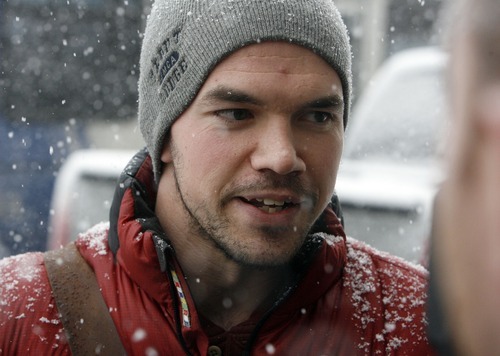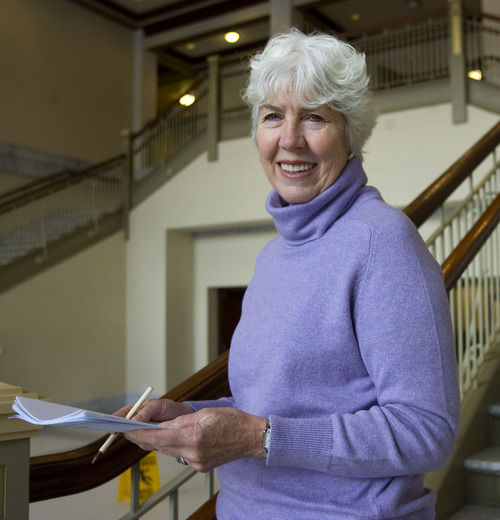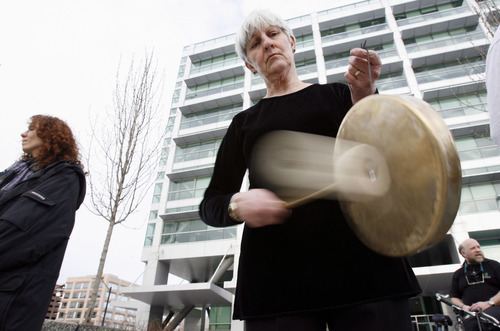This is an archived article that was published on sltrib.com in 2011, and information in the article may be outdated. It is provided only for personal research purposes and may not be reprinted.
Editor's note: This story was originally published Feb. 22, 2011.
A Quaker and a seasoned peace activist, Diana Hirschi knew that when she tried to block a shipment of missile motors from the Hercules plant in the western Salt Lake Valley in the 1980s, she could be thrown in jail for up to six months.
The east Salt Lake City resident weighed that prospect against her goal — to call attention to what she saw as a shameful bomb-enabling business in her own backyard — and decided the risk was worth taking.
Now, some 2½ decades later, a new-generation Utah activist faces potential imprisonment for an act of civil disobedience.
Environmentalist Tim DeChristopher, 29, is scheduled to go on trial Monday in Salt Lake City's federal court on two felony charges for entering bogus bids in an auction of gas and oil leases in December 2008.
Like Hirschi, DeChristopher draws support from a faith community with a long tradition of civil disobedience in the name of a greater good.
DeChristopher is a member of Salt Lake City's First Unitarian Church, where the Rev. Tom Goldsmith applauds the activist's actions as "trying to open our eyes to how we are raping the Earth in our attachment to fossil fuels."
The Quaker and Unitarian Universalist faiths embrace nonviolent civil disobedience — when necessary — but they are not the only religions to do so.
From East to West, many faiths hold that followers have the right — even the duty — to peacefully go against government when its laws or policies violate a higher law.
"What civil disobedience does is bring conscience to bear on political action," Goldsmith says. "All faiths would agree we have a moral responsibility to make the world a better place."
Indeed, many of the great social movements of recent centuries have been fueled by people informed by faith — and often arguing with their co-religionists.
Writer Henry David Thoreau, who gave civil disobedience its name in the 19th century and who influenced India's Mohandas Gandhi in the early 20th century, had Unitarian roots.
Gandhi was a Hindu and his own testimony of nonviolent resistance deeply affected Baptist preacher and civil rights icon the Rev. Martin Luther King Jr.
Christians — Quakers in particular — ran the underground railroad that rescued slaves in the South, and Christians and Jews alike got behind King during the civil rights movement of the mid-20th century.
In the 1980s, mainline Protestants — such as Presbyterians, Methodists, Episcopalians and Lutherans — harbored Central Americans fleeing civil unrest as part of the sanctuary movement. In the same decade, Catholics and Quakers were key leaders in the peace push protesting nuclear weapons' testing on Nevada's high desert.
Even today, anti-war demonstrators arrested on the White House lawn include Buddhists, and at least one Mormon woman has been arrested outside the U.S. Army's School of the Americas in Fort Benning, Ga.
Hirschi did not go to jail in the 1980s. A jury acquitted her and two companions of trespassing at Hercules, which since was bought by ATK Aerospace Systems. But she never has regretted that arrest or the several times she was busted for entering the Nevada Test Site.
"Social change is made in the streets," says Hirschi, cheered by the revolts in the Middle East. "That's the only place it really happens, ultimately, because people with power do not want to give it up. As Gandhi did, you keep pushing and pushing and pushing."
The left and the right
In modern America, it's not just left-leaning religious types who flirt with civil disobedience.
Nearly 500,000 Christians, many of them evangelicals, have signed the Manhattan Declaration, an online manifesto that puts government on notice that there will be open defiance if laws on issues such as abortion, end-of-life care and gay marriage require people of faith to violate their consciences.
"At some point, we are going to say, 'Enough is enough and we will defy such laws,' " says Greg Johnson, president of the Utah-based Standing Together and a member of the National Association of Evangelicals' board of directors.
Johnson signed the declaration, which went online in late 2009.
For Johnson and others, the teachings of Jesus Christ and the witness of early Christians, thousands of whom were martyred for their faith, provide the model for civil disobedience.
Jesus taught that government has its proper sphere, and that his followers should "turn the other cheek," when insulted or accosted. For Christians, that is often taken as a model for nonviolent resistance.
"There is a great effort in the Christian tradition to honor government even if it's tyrannical or you disagree," Johnson says. "But we cannot go so far as to violate God's clear teaching on any matter, morally or theologically."
For Mormon pacifist Ron Madson, the anti-war ethic of the early Christians is a model.
"For the first three centuries, they refused to take up military arms at all," says Madson, an Alpine attorney who has studied civil disobedience for decades. "They were, in my opinion, the first unified body that was civilly disobedient."
Greek philosophers such as Socrates had described a higher law than the state's and philosophers such as Thomas Aquinas, a Catholic priest in the 13th century, and John Locke in the 17th century, held that people have rights that transcend those allowed by the state.
Such beliefs are enshrined in teachings of the Christian faith, such as those articulated in the Catechism of the Catholic Church, published under Pope John Paul II in the 1990s.
In his own faith tradition, that of The Church of Jesus Christ of Latter-day Saints, Madson notes there has been no unified civil disobedience since the late 1800s, when Mormons defied the federal government by engaging in polygamy. The practice went underground, but it took a generation to cease.
Since then, most Mormons have regarded the 12th Article of Faith — that the faithful are subject to rulers and must obey the law — as the sole dictate of the faith, ignoring, Madson says, Doctrine & Covenants Section 134, which recognizes conscience as a limit on government authority.
"The real tragedy is that when faiths begin to synchronize with the state, they lose their conscience, and that's what we've done," says Madson, who is part of the "Mormon Worker" community that has protested speakers such as former Vice President Dick Cheney and former Secretary of State Condoleezza Rice at Brigham Young University.
Though a slim minority of Latter-day Saints is anti-war, Madson says, "more and more Mormons are realizing we've got to quit raising our hand to sustain everything our government does."
Nonetheless, he says, "we're an immature faith and we don't have a real healthy or good tradition of civil disobedience."
Last resort and pure motives
So what does civil disobedience look like in the hands of religious people?
Those who have engaged in it say there are characteristics.
"It's a last resort to attempt to change a law or practice that is not moral," says Dee Rowland, the government liaison for the Catholic Diocese of Salt Lake City. "It's a last resort after you've done all that you can by writing letters and protesting."
Rowland was arrested three times for crossing into the Nevada Test Site in the late 1980s and early 1990s.
"It wasn't something I did spontaneously. It was very deliberate," Rowland says. She chose three occasions because that's how many grandchildren she had at the time. "I wanted the world to be intact for them.
"For me, it was a peaceful thing. You signed a covenant that you would harbor no anger but suffer the anger of the opponent," says Rowland, whose protest was part of the Nevada Desert Experience, co-founded by a Franciscan nun.
Hirschi, who lived for most of a year in a tent at the "peace camp" next to the Nevada Test Site, says civil disobedience also entails open communication with the opposition.
In the model she used, based on the work of Gandhi, King and "Catholic Worker" founder Dorothy Day, "You always give your opponents a chance to change their mind and try as best you can to treat them with respect," Hirschi says.
She and others opposed to Hercules' manufacturing of missile motors met several times with company executives. "That is very critical," Hirschi says, "to ... building bridges to bring about social change."
Rowland and Hirschi say that a willingness to accept the consequences for civil disobedience is paramount. In Rowland's case, that resolve was put to the test. Her court date in Nevada happened to be on her daughter's wedding day.
In the end, the trespassing charge was dismissed, and she didn't have to choose between her daughter and a judge. "It was a real dilemma," she says.
Though DeChristopher acted alone, he says the First Unitarian community's backing for his commitment to climate-change activism proved vital.
"I wasn't just an isolated individual," he says. "I was connected to that larger community that I knew would support me."
Madson says he would add another criteria to faith-based civil disobedience: It cannot be self-serving.
"The richest, most noble tradition of civil disobedience," he says, "has to do with standing in the breach for someone else."
That's why the disobedience that contributed to abolition of slavery is remembered as a watershed moment, while the early Mormon defense of polygamy is not.
As Madson says, the virtue of an act of civil disobedience can often be seen only in retrospect.
Brandon Loomis contributed to this story. —
What is civil disobedience?
"Refusal to obey governmental demands or commands especially as a nonviolent and usually collective means of forcing concessions from the government."
Source: Merriam-Webster Dictionary, online at http://tinyurl.com/6gzktrg —
LDS 12th Article of Faith
"We believe in being subject to kings, presidents, rulers, and magistrates, in obeying, honoring, and sustaining the law."
LDS Doctrine and Covenants 134:4
"We believe that religion is instituted of God; and that men are amenable to him, and to him only, for the exercise of it, unless their religious opinions prompt them to infringe upon the rights and liberties of others; but we do not believe that human law has a right to interfere in prescribing rules of worship to bind the consciences of men, nor dictate forms for public or private devotion; that the civil magistrate should restrain crime, but never control conscience; should punish guilt, but never suppress the freedom of the soul." —
Catholic Catechism, paragraphs 2239 and 2242
"It is the duty of citizens to contribute along with the civil authorities to the good of society in a spirit of truth, justice, solidarity and freedom. ... The citizen is obliged in conscience not to follow the directives of civil authorities when they are contrary to the demands of the moral order, to the fundamental rights of persons or the teachings of the gospel." "
Civil disobedience becomes a sacred duty when the state has become lawless or corrupt."
Mohandas Gandhi
"A very few — as heroes, patriots, martyrs, reformers in the great sense, and men — serve the state with their consciences also, and so necessarily resist it for the most part; and they are commonly treated as enemies by it."
Henry David Thoreau
In "On the Duty of Civil Disobedience"
"I submit that a person who breaks a law that conscience tells him is unjust, and who willingly accepts the penalty of imprisonment in order to arouse the conscience of the community over its injustice, is in reality expressing the highest respect for law."
The Rev. Martin Luther King Jr.
In "Letter from Birmingham Jail"







